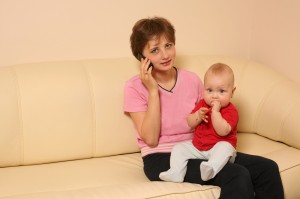
The period after giving birth to a child can be difficult for women and in the first twelve weeks after childbirth 13-19% of women will experience post-partum depression (O’Hara 1996, Gaynes 2005). Post-partum depression is bad news – not only does it increase the chance of the mother going onto develop a severe clinical depression but it also can affect the quality of the mother-child bond during a critical period in the development of the infant, and this can have long term effects.
This Cochrane review set out to see if it is possible to prevent postpartum depression using psychological and psychosocial interventions. To do this they examined randomised controlled trials which compared the effectiveness of these interventions to usual care, delivered either before or after childbirth.
The review also tried to determine the characteristics of the most successful interventions, and whether interventions were more effective in the subgroup of women at high risk of developing postpartum depression.
Methods

The studies examining the same intervention were examined for heterogeneity, and this was taken into account when determining overall outcomes
A comprehensive literature search for randomised controlled trials was performed. Sources included the Cochrane Central Register of Controlled Trials, MEDLINE, EMBASE, hand searching of a further 74 journals, and the proceedings of major conferences. The studies were carefully assessed for bias by two blind, independent reviewers – including methods of allocation of women to intervention groups, assessor blinding, and selective reporting bias. The studies examining the same intervention were examined for heterogeneity, and this was taken into account when determining overall outcomes.
They identified twenty-eight randomised controlled trials of acceptable quality (‘good to excellent’), involving almost 17,000 women, which compared a psychosocial or psychological intervention compared with usual care before or after childbirth.
The effectiveness of interventions was presented in two ways – either a risk ratio (RR), in the case of categorical data (e.g. depressed versus non-depressed) or a standardised mean difference, in cases where scores were taken on various questionnaires (e.g. the Beck Depression Inventory).
Results

Women who received any psychological or psychosocial intervention had a 22% reduction in their chance of developing post-partum depression
- Firstly, they found that women who received any psychological or psychosocial intervention had a 22% reduction in their chance of developing post-partum depression compared with those who received standard care (average RR 0.78, 95% confidence interval (CI) 0.66 to 0.93; 20 trials, 14,727 women).
- Subgroup analysis found that the most effective types of intervention were intensive, individualised postpartum home visits, lay (peer)-based telephone support, and interpersonal psychotherapy. It was also found that interventions that were initiated in the postpartum period were also effective. Individual and group-based interventions were found to have similar effectiveness.
- Selecting women for intervention based on the presence of risk factors for the development of postpartum depression decreased the onset of postpartum depression by 34% (RR 0.66, 95% CI 0.50 to 0.88; eight trials, 1853 women).
- There was limited evidence on the comparative effectiveness of professionally-delivered versus lay-based interventions, and for interventions that were delivered as a one-off or on multiple occasions.
Conclusions

People don’t need to have large portions of the alphabet after their names to make a difference to the wellbeing of women post childbirth
The overall conclusion presented in this review is that even in an era of increasing complexity and in depth biological understanding of mental illness, good, old-fashioned phone calls to ask ‘how are you going?’ still have a big impact on the well-being of women in the postpartum period.
Interventions don’t need to be complicated or expensive – phone calls work well, group based interventions are as effective as individual attention, and it would seem that people delivering these interventions don’t need to have large portions of the alphabet after their names to make a difference to the wellbeing of women post childbirth.
This is a good quality review of the best available evidence from clinical research. The authors found that there is strong evidence to recommend implementing several interventions for the prevention of postpartum depression:
- Intensive home visits by nurses
- Flexible postpartum care by midwives
- Postpartum peer based telephone support
- Interpersonal psychotherapy.
On the other hand, the reviewers did not find enough support in the literature to recommend implementation of other interventions such as:
- Antenatal and postnatal classes
- Postpartum lay home visits
- Early postpartum follow up
- Continuity of care models
- In-hospital psychological debriefing
- Cognitive behavioural therapy
It may also be more beneficial and feasible to target at risk mothers rather than all women post-childbirth.

Could interpersonal psychotherapy be provided over the phone or over the internet and still be as effective?
There are still questions that remain – what is the component of psychosocial interventions that actually reduces postpartum depression? What should be the role of a postpartum depression screening tool – is early detection the key to determining who should get interventions? Could interpersonal psychotherapy be provided over the phone or over the internet and still be as effective? The authors also recommend further research into the effectiveness of lay based interventions to confirm findings as to its efficacy.
Links
Dennis CL, Dowswell T. Psychosocial and psychological interventions for preventing postpartum depression. Cochrane Database of Systematic Reviews 2013, Issue 2. Art. No.: CD001134. DOI: 10.1002/14651858.CD001134.pub3.
Gaynes BN, Gavin N, Meltzer-Brody S, Lohr K, Swinson T, Gartlehner G, et al.Perinatal depression: prevalence,screening accuracy, and screening outcomes. 2005
O’Hara M, Swain A. Rates and risk of postpartum depression – a meta-analysis. International Review of Psychiatry 1996;8:37–54. [Abstract]

RT @Mental_Elf Psychosocial and psychological interventions can prevent postpartum depression http://t.co/EENFE6epcF
“@Mental_Elf: Psychosocial and psychological interventions can prevent postpartum depression http://t.co/ube96Job9X” @JonnyB_at_RMP VG read
Our new blogger @markhoro has published his first blog today on #postpartum #depression http://t.co/NPeLQ5lVQ3 Welcome Mark!
This is a serious problem, for new mum and baby, and more support is needed. I have some expertise in this particular area and found support seriously lacking, mental health services in Midlands havwe downgraded the unit of Prof BROCKINGTON shame on nhs
Pls RT @cochranecollab Psychosocial & psychological interventions can prevent postpartum depression http://t.co/NPeLQ5lVQ3
“@Mental_Elf: @cochranecollab Psychosocial & psychological interventions can prevent postpartum depression http://t.co/963IEIkJYF”
#Talking cure can prevent #postpartum #depression http://t.co/QXopAtrEo9 via @Mental_Elf @cochranecollab #babyblues #counselling #therapy
Pls RT @MindCharity Psychosocial & psychological interventions can prevent postpartum depression http://t.co/NPeLQ5lVQ3
Pls RT @Rethink_ Psychosocial & psychological interventions can prevent postpartum depression http://t.co/NPeLQ5lVQ3
psychotherapeutic interventions can prevent postpartum depression by almost a quarter http://t.co/ZtYN2vQ3rM via http://t.co/lkVBDT0tQl
MT @Mental_Elf #Psychosocial and psychological interventions can prevent #postpartum #depression http://t.co/YVFU1tSPMI #mentalhealth
Cochrane finds that psychological/psychosocial treatments bring a 22% reduction in postpartum depression http://t.co/oWDDSwdTO9
A cochraine review of psychosocial interventions. Quantifying is methodologically unsound but conclusions are great http://t.co/VmG0ldLoco
My first blog on the the mental elf site about perinatal depression : http://t.co/AQBKnGmRjn
Home visits, telephone support & interpersonal psychotherapy are best for postpartum depression says Cochrane http://t.co/NPeLQ5lVQ3
Preventing postpartum depression MT“@Mental_Elf: Home visits, phone support & interpersonal psychotherapy …Cochrane http://t.co/xRzSkgj3VK”
@Mental_Elf This is how we have delivered our #pnd service since 2002 and we now support globally too @ http://t.co/1PeXu2lsFF #mumsmatter
@Mental_Elf That is a very interesting* article. Thanks for posting.
*Echoes my own experience!
@cochranecollab Individual & group-based treatments for postpartum depression have similar effectiveness http://t.co/NPeLQ5lVQ3
MT @mental_elf Individual & group-based treatments for postpartum depression have similar effectiveness http://t.co/qRLuexBFDn #Cochrane
Check out this blog from the Mental Elf on a new Cochrane review on preventing postnatal depression… http://t.co/pdU8oOSGIR
shared :)
Phone calls asking ‘how are you going?’ have a big impact on the well-being of women in the postpartum period http://t.co/NPeLQ5lVQ3
Revisión sobre la prevención de la depresión post-parto http://t.co/trqqONRXUB Ayuda: llamada preguntando cómo van las cosas. No ayuda: CBT
#Cochrane find strong evidence to recommend several interventions for preventing #postpartum #depression http://t.co/NPeLQ5lVQ3
Having been diagnosed with “depression” that turned out to be pernicious anemia, I have to wonder if some post-partum depressions might be deficiencies, especially iron deficiency.
Do doctors routinely test women after delivery? What the fetus wants, the fetus takes. An old wives’ saying is “For every child, a tooth.” Pregnancy and childbirth can be very taxing physically on the overall health of a woman.
RT @Mental_Elf: You don’t need half the alphabet after yr name to make a difference to the wellbeing of women post childbirth http://t.co/N…
Psychosocial and psychological interventions can prevent postpartum depression, says new Cochrane review http://t.co/j2NT3tF72h
RT @Mental_Elf: Postpartum depression screening: is early detection the key to determining who should get interventions? http://t.co/NPeLQ5…
Psychosocial interventions can prevent “postpartum depression” says new Cochrane review http://t.co/zBYdgy1qkd”@BigPhilHickey
RT @Mental_Elf: What is the component of psychosocial interventions that actually reduces postpartum depression? http://t.co/NPeLQ5lVQ3
http://t.co/6wgdNGEoJp @CollegeGrlWstd
http://t.co/ar1rIrDs9k psychosocial and psychological interventions can prevent postpartum depression #pnd
I am amazed that I didnt get post partum depression, but had a friend in Vancouver who had it very badly. Great article
Psychosocial and psychological interventions can prevent postpartum depression, says new Cochrane review – http://t.co/ar1rIrDs9k
Interesting via @Mental_Elf http://t.co/UAK3gA3f0C
[…] Les omtalen i The Mental Elf her […]
Regarding post partum psychosis, I wear the teeshirt for that one. I am not convinced that pre and peri natal care are the answer. This misses out the crucial factor of caring for the child, prior to birth. Yes, you care for the mother, but you forget the child and how the child has already been affected by whatever has happened to the mother. My view is that effort should be concentrated on ensuring a safe and happy and secure birth, and also on excellent post natal care for mother and baby, if necessary in a specialist unit together, where caring staff are available to help the mother at all times. I have heard too many stories of women being separated from their babies at birth, and that is just not right, either for mother or for baby. So much extra work then has to go into caring for the baby, and for the mother, separately, and yet they need to be cared for together. Other people may not be permitted to visit or to be around alone with the baby or the mother, for a while, but that may be the best thing for mother and baby, especially when we are thinking beyond the initial stages of care. Are there any other women out there who understand what I am talking about?
Or even any other men who are involved in caring for these women? Too many women have suffered injustice at the hands of the law, largely a male dominated profession to this day. Change is needed, and the sooner the better.